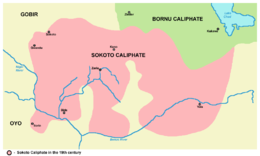
The sultan of Sokoto is the hereditary leader of the Sokoto Caliphate, a Sunni Muslim community in West Africa. The position may also be referred to as the 'Sokoto Caliph' or the "Commander of the Faithful" (Amir-ul-Momineen in Arabic or Lamido Julbe in Fulani). The current holder of this title, since 2006, is Sa'adu Abubakar. [1] The sultan of Sokoto is the leader of the Qadiriyya Sufi order, historically the most important Muslim position in Nigeria and senior to the Emir of Kano, the leader of the Tijaniyya Sufi order.[2] The post has become increasingly ceremonial since British rule defeated the caliphate and replaced it with the Sokoto Sultanate Council in 1903, but the sultan – considered a spiritual leader in the Muslim community in Nigeria – can still carry much weight with Fulani and Hausa people from northern Nigeria.

Usman dan Fodio, the founder of the dynasty of Sokoto State and of the Fulani Empire (consisting of the Fulbe Jihad states of which Sokoto was suzerain), never used the high style of Sultan but was simply titled Amir al-Mu´minin . The first to assume the title of Sultan was Fodio's son Muhammed Bello, who ruled from 1817 to 1837. Since the creation of the title, there have been nineteen Sultans of Sokoto, all men from the Torodbe scholar caste who are descended from Usman dan Fodio. Siddiq Abubakar III was the longest serving Sultan, holding the position for 50 years from 1938 to 1988. The shortest reign was that of Muhammadu Attahiru I, who held the position for five months in 1902–03. The 17th sultan, Ibrahim Dasuki, was forcefully deposed in 1996 by the Sani Abacha military government of Nigeria.[3]
Prior to the beginning of the Fulani Jihad of 1804, the ethnic category Fulani was not important for the Torodbe and their literature reveals the ambivalence they had defining Torodbe-Fulani relationships. They adopted the language of the Fulani and much ethos while maintaining a separate, non-ethnic identity.[4] The Torodbe clan at first recruited members from all levels of Sūdānī society, particularly the poorer people.[5]
- ^ "The new Sultan of Sokoto Saad Abubakar sits on his throne during his coronation ceremony in Sokoto, Northern Nigeria". The Dream Daily. Retrieved 2024-07-08.
- ^ All Africa: "Nigeria: Updated - Kano Blasts Claim Over 60" by Ismail Mudashir, November 28, 2014
- ^ Ajayi, Jacob F. Ade (1989). Africa in the Nineteenth Century Until the 1880s. University of California Press. ISBN 978-0-520-03917-9. Retrieved 2013-02-13.
- ^ Ibrahim, Muhammad (1987). The Hausa-Fulani Arabs: A Case Study of the Genealogy of Usman Danfodio. Kadawa Press.
- ^ Willis, John Ralph (April 1978). "The Torodbe Clerisy: A Social View". The Journal of African History. 19 (2). Cambridge University Press: 195–212. doi:10.1017/s0021853700027596. JSTOR 181598. S2CID 162817107. Retrieved 2013-02-13.